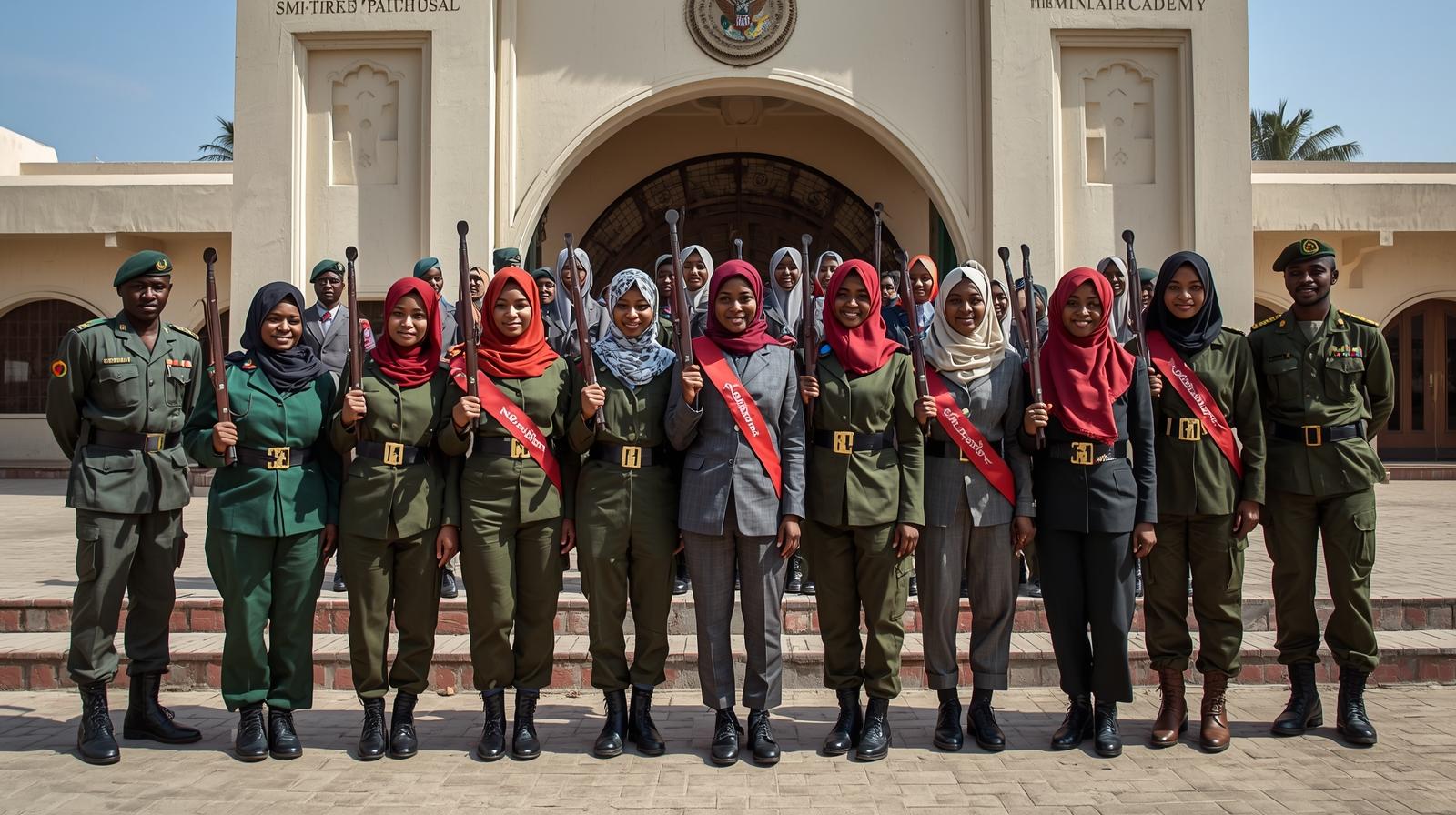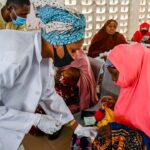Somalia’s recent commissioning of its first-ever female defence cadets is a reflection of a wider development that is progressively bringing more women into command, peacekeeping and reform in national militaries across Africa.
Somalia has, in the past week, commissioned its first-ever female defence cadets. The 11 women graduated from the Türkiye–Somalia Military Academy in Mogadishu, a milestone in a country rebuilding its armed forces after decades of conflict.
According to Somalia’s battalion commander Jamal Hassan Ali, it was an “inspiring dawn for the Somali National Army.”
For Kennedy Mfum, a Ghanaian security analyst, the moment carries weight beyond symbolism.
“It challenges entrenched perceptions of African defence sectors as exclusively male domains,” he said in a call. “It reframes Africa’s defence sectors by showcasing them as spaces where women are asserting visibility, authority, and impact.”
A continental shift
Across the continent, African militaries are undergoing a similar shift. From Ghana to South Africa and Rwanda to Nigeria, women are not only entering the ranks but are also shaping peacekeeping missions and moving into leadership pathways.
A decade ago, few militaries had clear policies for recruiting or promoting women, according to UN Women. Today, the trend is changing. Data from 30 countries reporting to the UN shows that by 2022 women made up, on average, 12% of army personnel, 15% of air force personnel, 14% of naval personnel, and 16% of gendarmerie personnel.
Ghana, for instance, has moved from policy talk to appointments. The Ghana Armed Forces is targeting 25% female recruits by 2028 and has already placed women in combat and command roles, including the Navy’s first female commanding officer in 2024.
In South Africa, women hold senior positions in command and intelligence, such as Lieutenant-General Thalita Mxakato in defence intelligence. Rwanda, one of the world’s top troop contributors to UN missions, had more than 600 uniformed women deployed as of January 2025.
Kenya is also recording milestones in elevating women within its defence ranks. Major General Fatumah Ahmed (now retired) became the country’s first female Air Force Commander, while Major General Joyce Sitienei was promoted to senior leadership as Deputy Vice-Chancellor at the National Defence University–Kenya, both unprecedented appointments in East Africa’s military landscape. Institutional reforms are reinforcing these gains.
The Kenya Defence Forces has adopted gender policies, including a Prevention against Sexual Exploitation, Abuse and Harassment (PSEAH) policy in 2025, and is piloting a Women Leadership Development Course under the Kenya Navy with support from the Denmark–Kenya partnership.
The initiative is designed to prepare more women officers for decision-making roles, embedding leadership training as part of KDF’s long-term transformation.
According to Mfum, “women are now in commanding units, shaping operational strategy, and determining how militaries engage with civilian populations.”
The Women, Peace and Security (WPS) agenda has been central to this transformation. Anchored in UN Security Council Resolution 1325 of 2000 and adopted in African Union frameworks, it laid the groundwork for integrating gender perspectives into peace and security.
For years, progress was uneven, but by 2025, more than 30 African countries had adopted national action plans embedding gender targets in recruitment, deployment, and promotion.
“Some are pairing these with budgets and monitoring frameworks, ensuring that commitments translate into measurable action,” according to UN Women.
Somalia’s progress and beyond
Somalia’s commissioning of female cadets coincides with the country’s broader security progress. The 2025 Global Peace Index ranked Somalia 14th from the bottom, moving it out of the world’s ten least secure countries for the first time in years.
In 2022, when President Hassan Sheikh Mohamud was re-elected, Somalia ranked sixth from the bottom. The Ministry of Defence credited reforms, intensified operations against Al-Shabaab, and the resilience of Somali citizens.
Beyond representation, studies by UN Women suggest women’s participation is shaping operational outcomes. Units with higher female presence report fewer cases of misconduct and stronger community relations, advantages critical for peacekeeping missions.
A 2021 African Union report—Report on the Implementation of the Women, Peace & Security Agenda in Africa—also noted improved outcomes in civilian protection and community trust when women serve in uniform. The breakthroughs are increasingly global.
In 2024, Ghana’s Major General Anita Asmah became the first African woman to command a UN peacekeeping force when she was appointed Force Commander of the UN Disengagement Observer Force in the Golan Heights.
In Abyei, a disputed area between Sudan and South Sudan, Police Commissioner Violet Lusala has led community protection initiatives under the UN mission, establishing women’s networks and building trust in one of the continent’s most contested zones.
And in the same region, legal officer Doris Mogga has deployed mobile courts to deliver justice for survivors of gender-based violence, linking peacekeeping with broader rule-of-law reforms.
Partnerships are reinforcing these gains. Somalia’s collaboration with Türkiye, for instance, now spans training for land, air, and naval officers, blending capacity-building with inclusion.
Sierra Leone’s armed forces this year secured support from the Elsie Initiative Fund to expand women’s participation in peace operations. The project will overhaul training facilities, healthcare access, and gender policies, while boosting the pool of female personnel eligible for deployment.
With nearly half of Sierra Leone’s deployed peacekeepers already women, the initiative aims to entrench progress and prepare more women for leadership. According to Mfum, the trajectory is clear.
“Africa’s militaries are no longer imagined as all-male institutions. They are becoming arenas where women claim authority, visibility, and impact,” Mfum said.
bird story agency
Somalia's recent commissioning of its first-ever female defence cadets signifies a broader trend across Africa, where women are increasing their presence in military roles, influencing command, peacekeeping, and reform efforts. The Somali cadets graduated from the Türkiye–Somalia Military Academy as part of a countrywide effort to rebuild its armed forces. This milestone reflects shifts in African defence sectors, which are progressively opening up to female participation, challenging traditional male-dominated perceptions, and demonstrating women's growing impact and authority.
Continent-wide, African militaries have witnessed notable changes, with countries such as Ghana, South Africa, Kenya, and Rwanda taking active steps to integrate women into their military forces. These steps include promotions to senior positions, implementation of gender policies, and special initiatives for leadership development. The African Union's Women, Peace and Security (WPS) agenda has been central to this transformation, leading to national action plans and the integration of gender perspectives.
This expansion in female participation in the military aligns with broader improvements in Somalia's security landscape. The increased presence of women in military roles has been linked to improved operational outcomes, better community relations, and lower instances of misconduct. Numerous partnerships and initiatives across Africa, such as those in Sierra Leone, aim to reinforce these gains, preparing more women for leadership roles and further solidifying their position in peace operations. The trajectory is clear: African militaries are evolving to become more inclusive and diverse spaces where women claim authority and make impactful contributions.






